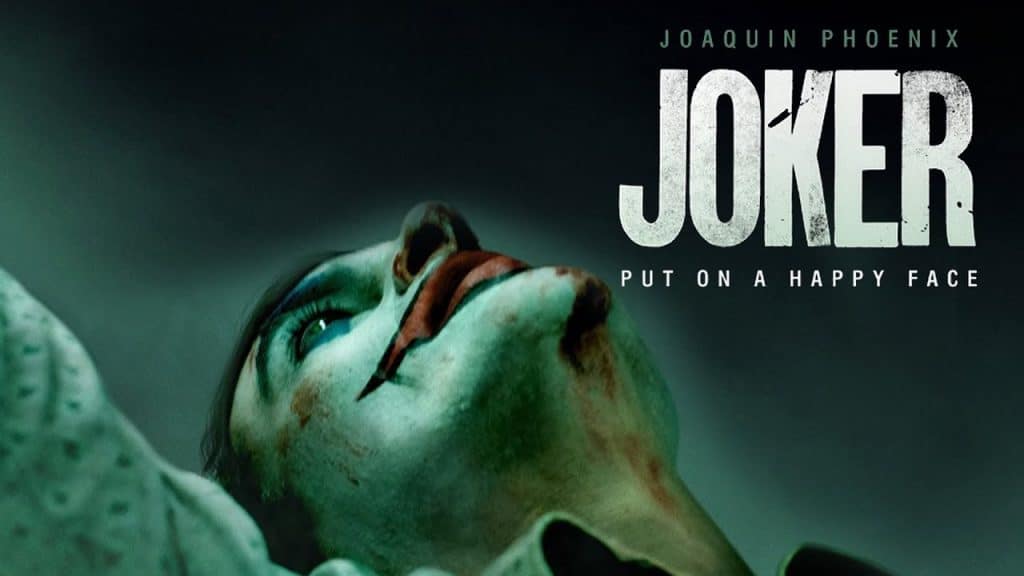“The worst part about having a mental illness is that people expect you to behave as if you don’t”
– Arthur Fleck
Everyone is wrong about Joker. Nobody got the joke.
To be honest, I had no idea how big a ruckus this movie was causing until after I saw it (while visiting Asheville, North Carolina)…
And then I looked up some reviews.
In a time when the general mood of America is becoming “Wake me up when this sh** is over with”…
The Joker movie has pierced a bulging and irritated nerve.
“What does it mean?” the pundits pondered.
Alas, they didn’t ponder for very long.
Before the dust settled — and, astonishingly, even before the movie was released — everyone reached for their flavor of vindication.
He’s a dangerous rallying cry for sexless, angst-ridden males!
No! He’s an unhinged loner finding his place and his life’s meaning through violence!
No! He’s a product of a country that doesn’t take its mentally ill seriously enough!
No! He’s showing us why gun control is needed (or doesn’t work)!
No! He’s the radical left’s maniacal leader for the “Eat the Rich” movement!
No! He’s the “people’s hero”!
But perhaps, says this particular keyboard clatterer, he’s none of it…
Perhaps he doesn’t fit in any of our preconceived boxes.
After all…
The figure of the joker, jester, fool, or trickster is nothing new.
It’s an ancient, archetypal figure, showing up in all cultural myths all throughout human history.
It’s a spontaneous and universal manifestation of human nature.
The trickster has always, throughout history, played the same role.
He always shows up in times of disorder and chaos. He always emerges when the rubbish of the time has piled up to become unbearable. (In Gotham, we see this portrayed symbolically with the pile-up of trash.)
And this time is no different.
As I make the case below, he’s the archetypal character (and energy) of our age, which is precisely why he’s evoked such strong and multifaceted reactions.
The truth?
Although many in the “scapegoat culture” of the mainstream hard right, hard left, hard center and everything in between have called the film a propaganda flick from the enemy…
I’ll present to you a different take.
(Buckle up, we’re going deep.)
The gist:
The genius of the movie Joker, in true trickster fashion (much as Dave Chappelle, also invoking the trickster energy, did brilliantly in his recent Netflix special), is it smashes all of today’s political narratives.
Take a step back…
This is the function of the mythical (and “enlightened”) trickster.
This is precisely what the Joker does in the Batman series, pitting everyone against one another, ratcheting up the conflicts to a fever pitch, taking no sides, cackling at how easily people are fooled.
And, as the hysteria over the film caused massive police presence at movie theaters in America…
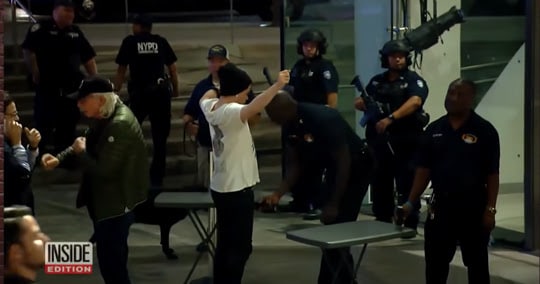
If you listened closely enough…
Perhaps you too could hear the Joker laughing at the absurdity.
[An interesting sidenote: The second IT movie came out two weeks before Joker, which depicts an evil clown who violently kills kids. It was released with virtually zero ballyhoo not because it might incite violence (as was the much-lauded, and totally B.S. reason why Joker shouldn’t have been made), but because IT is clearly evil… and easy to pin down as such. Joker? Not so much. It’s the ambiguity of the character that’s truly unsettling… not the rationalizations.]
FAIR WARNING: SPOILER ALERT!
If we are to take the Joker movie at face value…
Arthur Fleck is not yet Batman’s Joker.
Where Joker is amoral, detached, and strangely charismatic…
Fleck is a people-pleaser, a wimp, a scared little boy trapped in a man’s body who just needs a hug from his dad.
Where Joker is cold and emotionless…
Fleck is overwhelmed by his emotions, tormented by his uncontrollable laughter, and unable to muster up a genuine smile.
Where Joker embraces and even loves his dark thoughts and fantasies…
Fleck runs away from them at full speed, unable to stuff them down deep enough. (Yet, repression never works and always finds a way, as Freud observed, to “slip” out.)
Where Joker airs his grievances freely…
Fleck is a doormat for his boss, strangers, and co-workers.
Joker knows people think he’s bad and he doesn’t care.
Fleck believes he is good and pure and innocent and was “put here to spread joy and laughter.”
Fleck is afraid to cause disruption, dissatisfaction, and disorder.
Joker revels in chaos and destruction.
Fleck wants the world to love him and wants to get better, and believes being nice (and hiding how he truly feels) is how he does it.
Joker sees that the “nice” and “polite” world that Fleck wants to be loved by is dishonest and a bonfire of the vanities.
[Written in 1987, the book Bonfire of the Vanities, in cynical Joker-esque fashion, arrived at this moral: Everyone is out for himself or herself; calls for justice and equality are covers for cash and power grabs; and we shouldn’t take any of it seriously, so just sit back and enjoy the show.]
In his fully “awakened” state…
Joker knows he’s a clown…
And he knows something else about everyone else, too.
(More on what he knows in a moment.)
Joker, in short, is Mr. Hyde to Fleck’s Dr. Jekyll.
Joker is Fleck’s “shadow” that has, like good ol’ Walter White, overwhelmed him and broken bad.
And, in this transformation, the unthinking mob gives him what he wants (admiration) for reasons he did not intend.
The mob celebrates him, raises him up as a hero.
While Fleck felt dead inside, the Joker is ALIVE.
And he not only resents Fleck for wearing a mask for everyone else…
He also resents everyone else for their masks, too.
And he wants to see how people deal in society when all bets are off…
He wants to see what happens when all the fake social masks are gone.
FULL JOKER STATUS
The full picture becomes clear when we see the Joker in his totality elsewhere.
Throughout the comic books, the Joker tells stories about how he got his scars… how he went mad… why he causes such havoc.
He rarely ever tells the same story twice.
As he said elsewhere:
“Something like that happened to me… I’m not exactly sure what it was. Sometimes I remember it one way, sometimes another. If I’m going to have a past, I prefer it to be multiple choice!”
Unlike Fleck, he’s not tied to the past, nor is he attached the future.
He lives in the now.
Unlike our hyper-identitarian age, he’s not tied to his own identity… or any identity at all.
(Therefore, because we can’t pin him down, because he won’t fit into our predefined categories, he’s a total freak.)
He’s too slippery. And that’s an uncomfortable thing in an overconfident world where everyone believes they’ve hammered down everything that can move.
In a world where everyone, everywhere, impossibly enough, has it all figured out…
Post-Fleck is different.
Joker is eventually liberated by the fact that he has, as becomes his superpower, figured out nothing.
And doesn’t need to. He is, after all, a fool.
So he’s not invested in his persona. He has no need for an inflated ego. The ego is the enemy.
In this way, no matter what, he’s always going to disappoint you. (As he has the hard-nosed critics.)
If you think he’s on your side, he’s going to stab you in the back. (As he did in The Dark Knight, when he betrayed his fellow robbers.)
If you think he’s your enemy, he’s going to show you where you’re wrong. (As he tried to convey to Batman, also in The Dark Knight.)
His strength is that he doesn’t exist in your paradigm.
He doesn’t live by your codes, your rules, your dogmas.
While we “normies” desire for life to be predictable, tidy, and to fit our expectations.
He shows up to reveal that life doesn’t live by your rules.
To understand why it’s hard to pin him down, consider what Joan Didion wrote:
“We tell ourselves stories in order to live. We look for the sermon in the suicide, for the social or moral lesson in the murder of five.
“We interpret what we see, select the most workable of the multiple choices. We live entirely… by the imposition of a narrative line upon disparate images, by the ‘ideas’ with which we have learned to freeze the shifting phantasmagoria — which is our actual experience.”
Didion, after decades of being a cultural critic, settled upon an unsettling thought:
What if there is no grand narrative?
What if we’re just driven by a human need to make sense of the chaos?
If Joker had a philosophy, this would be the foundation. And you can see it slipping through in the Joker character.
And, in a way, he’s right.
The paradox is that while the grand narratives (or, in the past, cultural myths) serve us, when they break down, and chaos takes over, the only way out of the chaos and to a new grand narrative is in and through.
And either we allow the chaos to burn away our deadwood, that which we’re hanging onto but no longer need, or somebody will step in and do it for us. (And in the worst way possible.)
Joker, as he has pointed out, is just on the bleeding edge.
We talk a big game about our virtues from atop our soapboxes, but when push comes to shove, at our lowest, we’re all the same.
Our naivete about our own selves is the true danger.
“Their morals, their code; it’s a bad joke. Dropped at the first sign of trouble. They’re only as good as the world allows them to be. You’ll see- I’ll show you. When the chips are down these, uh, civilized people? They’ll eat each other. See I’m not a monster, I’m just ahead of the curve.” – Joker (Heath Ledger)
The Joker’s cynical nihilism (and the nihilism of our age), he believes, actually serves a purpose.
Wisdom is in knowing you’re a fool.
“Why so serious?”
– Joker (Heath Ledger)
IN STEPPETH THE FOOL
In the poker deck, the joker is the wild card, representing anything you want it to be.
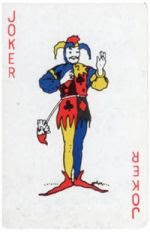
In the tarot, the Fool card is zero, representing the beginning and the end.
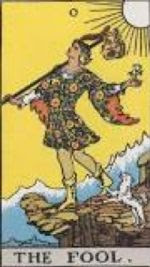
In life, we all start out as naive fools. And, ideally, if we’re lucky, we end it as wise fools.
This is why the Oracle at Delphi said Socrates was the wisest man to have ever lived. It was because he realized this: “I know only one thing: that I know nothing.”
And, of course, they killed him.
He asked too many questions.
We hate enlightened fools because they expose our own peacocking foolishness. They cast too many doubts on our most darling beliefs and convictions.
Therefore, as a result, we get no shortage of hardened and far-from-enlightened ones.
Therefore, we get the Joker.
Without being humbled by our inherent foolishness, we are doomed to repeat the mistakes of our ancestors.
As we see stretching back all throughout human history, ordinary people, no matter where they come from and how “good” they might think they are, have the capacity to commit and justify unspeakable acts.,,
Without such awareness, we are all in danger of becoming our own anti-heroes…
Of being “possessed” by our own fantasies about the world and the way it “ought to be,” and becoming precisely what we claim to hate.
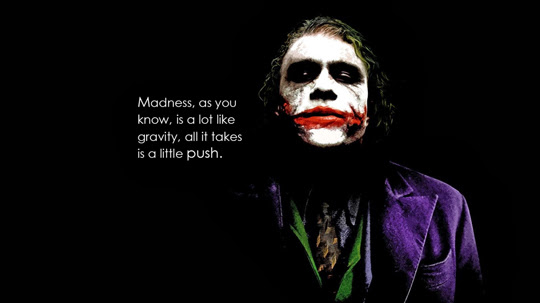
In steppeth the Fool.
THE KING IS DEAD
If the King represents order and generativity, the jester, his antithesis, represents chaos and destruction.
For that, they are natural partners. When the king loses his throne, the jester steals the crown.
As mentioned, just like the King…
The joker (or fool, jester, or trickster) is an archetypal figure that shows up in all places, times, and cultures throughout history.
Like the King, he’s recognized everywhere and always.
Native American societies, for example, had the Heyokas who could provoke laughter in distressing situations and despair. But the Heyoka could also instigate fear, confusion, and chaos when people became too complacent, apathetic, too confident, too secure, or if people took themselves too seriously, or believe they have more power than they truly do.
Historically, for this reason, the trickster is an enlightened figure.
Not because he’s good.
Not because he’s a saint.
But because he’s the only one who “gets the joke.”
THE JOKE?
“The only sensible way to live in this world is without rules.”
― The Joker, Heath Ledger
Mythically, the fool, as mentioned, is an enlightened figure, because he understands something others don’t…
And, because of this understanding, he can comfortably exist in the inherent paradoxes, contradictions, and ambiguities of life.
This trickster character, furthermore, has a light side and a shadow side.
On the lighter side, it’s the same function comedians serve when they tell a joke that simultaneously cuts through the B.S., “crosses the line,” kills the sacred cow, and lends a whole new, and surprising, transcendent, perspective.
Laughter is a spontaneous reaction to surprise.
When such spontaneity is stifled, it emerges at inappropriate times.
(Hence, Joker’s inappropriate laughter.)
The trickster’s destructive (and wholly spontaneous) actions can purify and rid the world of unwanted rubbish — typically ideas and paradigms that no longer serve us.
In this way, the trickster is the agent of creative destruction.
By way of example…
The coyote, known in many cultures as a trickster, is a predator. But he can also be a savior for his prey.
When hunters set traps, coyotes quickly wise up to them. They have been known to follow the hunters, dig up the traps, and let the hunter know they’ve been tricked.
One naturalist has written, “it is difficult to escape the conclusion that coyotes … have a sense of humor. How else to explain, for instance, the well-known propensity of experienced coyotes to dig up traps, turn them over, and urinate or defecate on them?”
In this natural act of creative destruction, the coyote keeps other animals from being trapped by the hunters.
He inverts the order.
The trickster doesn’t do it because he’s the good guy. He’s still going to eat the rabbit. He does it because he’s always interested in overturning the power structures. He wants to knock everyone down a peg, especially the powerful.
He thrives on the inversion. (Which is, by no accident, how we’ve always viewed the Devil.)
In this way, the trickster is the unlikely hero and villain. He’s both and neither. He’s never the hero we want. He’s always the villain we deserve.
In an identity-obsessed and egocentric age, he has no identity, no rallying cry, no political stance, no pet cause, no agenda.
Mayor Garcia: [regarding The Joker] What do we got?
Gordon: Nothing. No matches on prints, DNA, dental. Clothing is custom, no labels. Nothing in his pockets but knives and lint. No name. No other alias.
Our need to avoid things – to avoid the darkness, to look good at all costs — is what drives him.
Our discomfort by what he represents is what gives him strength.
He doesn’t abide by your rules. He abides by the violation of your taboos, guidelines, and rules. He thrives on subverting your expectations of what “ought to be.” His only rule is to break through your rampant “musturbations” and expose your hypocrisy. His only agenda is that he has no deeper agenda.
The most striking thing about the Joker is he doesn’t want to win.
“I’m like a dog chasing cars, I wouldn’t know what to do if I caught one, you know, I just do things.”
– The Joker, The Dark Knight
When the old ways no longer work, the jester steps in to destroy the old and make way for the new, more dynamic, and, most importantly, more realistic.
In the meantime, he’s going to have some fun.
“When the going gets weird,” said Hunter S. Thompson, “the weird turn pro.”
THE ENLIGHTENED FOOL
In his positive aspects…
He encourages others to embrace the moment and find spontaneous joy in the mundane.
He points out the fleck of dirt on the royal queen’s pristine and perfect dress.
He reveals the beauty in the shameful, dangerous, and beastly.
He finds the flaw in the flawless, and the perfection in the leperous.
The trickster, in his positive manifestation, approaches life in a fresh and innocent way. He is trusting, uplifting, and completely in the moment.
If he can’t perform this function with light-footed play and humor, well, then, he takes a more ballistic approach.
He will be anything but ignored.
(So goes the saying, “A god ignored is a demon born.”)
He reveals when and where we are grasping onto an old paradigm that’s little more than a corpse.
The rubbish is piling up, and nobody’s really doing anything about it.
It’s all ‘sound and fury, signifying nothing.’
So, here, he says, have more. Have as much you want. Take it all.
The message?
Until we confront our own contradictions, the dark jester will thrive, and sow further seeds of chaos.
Until we “get the joke,” shed our silly masks, and wake up, he’ll continue to wreak havoc.
And the flames will keep getting higher and, in his eyes, more magnificent.
Fleck, we learn, is living entirely in his own fantasies.
The line between fantasy and reality is obliterated.
Like the Sandman, the Joker possesses him with a series of mirages, fantasies, and illusions he mistakes for reality.
He builds Fleck wings of wax, flings him up towards the Sun, only to watch (in glee) as he crashes to the ground.
What’s the joke?
Joker exposes that, deep down, we’re all living in our own fantasy worlds.
We’ve all got it wrong.
Nobody has a grasp of the full picture.
Nobody truly gets it all.
(And, perhaps, there’s nothing truly to “get.”)
Finally, he reveals that our deepest, worst fear is true.
That, indeed, deep down…
(drumroll please for the punchline)
We’re all clowns.
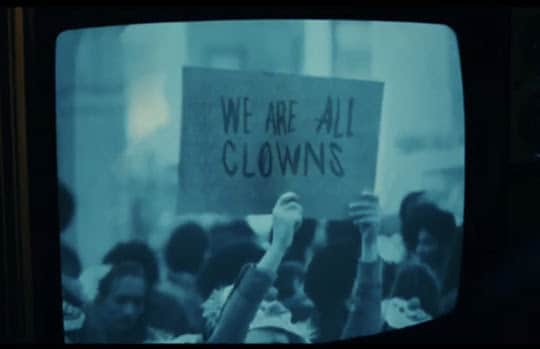
(ba-dum-tsss!)
So…
Put on a happy face.
Stop taking it all so seriously.
And, remember:
EVERYTHING MUST GO!!
Chris Campbell
Managing editor, Three Founders Publishing
